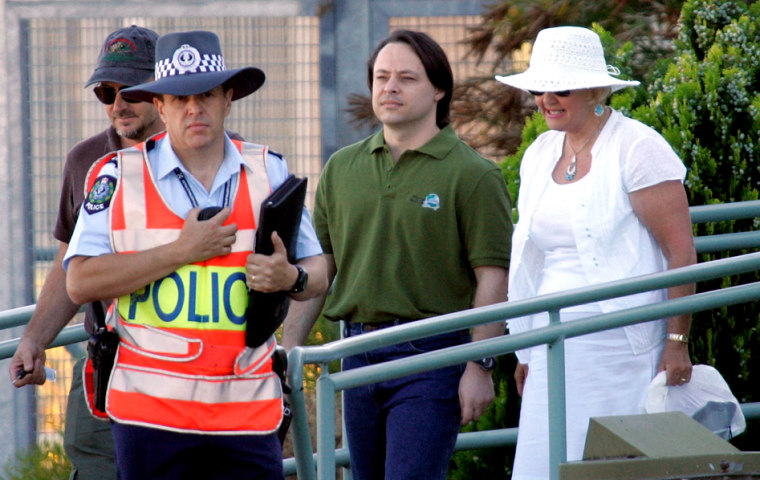Confessed terror supporter David Hicks was released from an Australian prison Saturday after completing a U.S.-imposed sentence for aiding al-Qaida.
Hicks became the first person convicted at a U.S. war crimes trial since World War II after he pleaded guilty in March to providing material support to a terrorist organization.
Caught fighting with the Taliban in Afghanistan in December 2001, Hicks spent more than five years without trial at the U.S. prison camp at Guantanamo Bay, Cuba, before a plea deal secured his transfer to Australia earlier this year.
The 32-year-old former Outback cowboy and kangaroo skinner was freed from South Australia state's Yatala prison, where he was picked up by his father and lawyer and driven away in a civilian car with a police escort.
Dozens of reporters and around 20 supporters gathered to catch a glimpse of the confessed Taliban gunman, who was taken to a secret location.
Released on condition of silence
Hicks did not stop to comment. But Hicks' father, Terry, and lawyer David McLeod later read a short statement in which Hicks thanked his family, friends and legal advocates for helping to secure his release.
Hicks refused to speak to the media directly for fear of being sent back to Guantanamo Bay. Under his plea deal, Hicks agreed to remain silent about any alleged abuse he suffered while in custody and also forfeited any right to appeal his conviction and agreed not to speak with the news media for a year from his sentencing date.
"It is my intention to honor this agreement as I don't want to do anything that might result in my return there," Hicks said in the statement.
Terry Hicks told reporters on Friday that his son would apologize for any wrongdoing he committed while in Afghanistan, but the statement contained no such apology. Asked about the omission, Terry Hicks said his son had served his time and had nothing to be sorry about.
Allegedly met bin Laden 20 times
During his incarceration at Guantanamo Bay, Hicks became somewhat of a cause celebre in Australia, where many activists and outspoken politicians criticized former Prime Minister John Howard for allowing an Australian to languish for years in a foreign jail without trial.
Around 20 supporters cheered at Hicks' release Saturday and held up signs that read, "Hicks is not a threat," an apparent reference to a recent court order allowing the government to place strict controls on the 32-year-old's movements.
Last week, a federal magistrate ruled that Hicks was a security risk because of the training he acknowledged receiving in terrorist camps in Afghanistan. The court was told he met al-Qaida leader Osama bin Laden at least 20 times, describing him as a "lovely brother" in letters home.
The magistrate ordered Hicks to report to police three times a week and obey a curfew by staying indoors at premises to be agreed on by police. Other restrictions include that he not leave Australia or contact a list of terror suspects. The restrictions will last for one year.
Described as an adventure-seeker
Throughout his ordeal, Hicks' lawyers referred to their client as a misguided adventurer who only traveled to Afghanistan because his application to join the Australian army had been rejected due to his lack of education. Terry Hicks has regularly maintained his son's innocence, saying he never intended to do anyone harm.
Hicks' family and lawyers have said he is suffering from psychological problems related to his long detention at Guantanamo Bay, but that he is now focused on finding a job to fund university courses in environmental studies. Now that his sentence is over, they say Hicks just wants to lead a normal life.
The only other Australian to be sent to Guantanamo Bay was Mamdouh Habib, who was detained in Pakistan in October 2001 and released in January 2005 after officials found there was insufficient evidence to lay charges.
